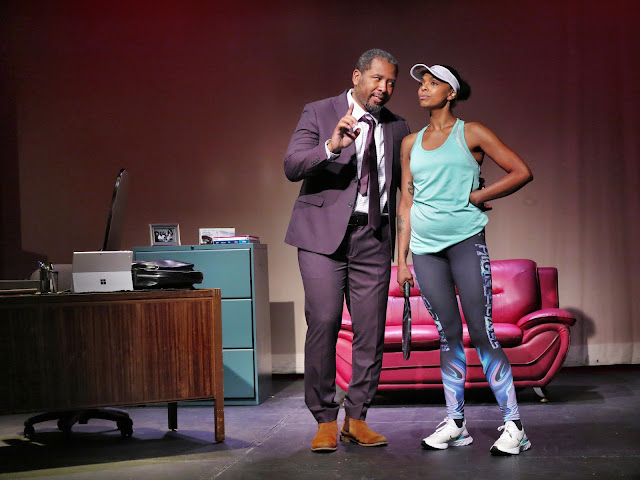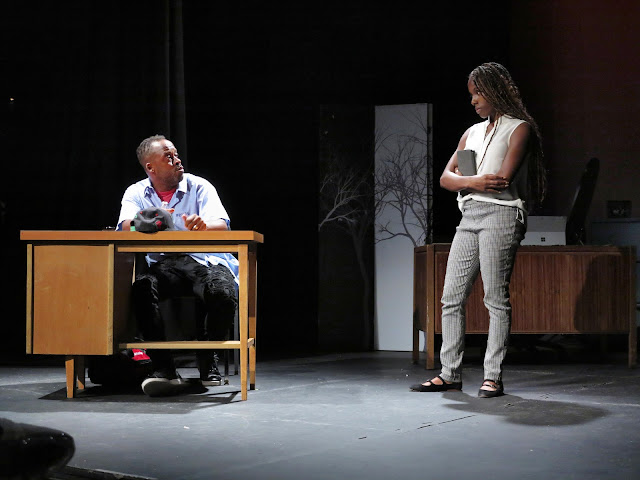Mecca Is Burning
Written by Cris Eli Blak, Lisa McCree, Levy Lee Simon, and Mona R. Washington
Contributing writer: Karen Brown
Directed by Karen Brown
Harlem School of the Arts, 645 St. Nicholas Ave., Manhattan, NYC
August 10-20, 2023
 |
| A couple is estranged by their responses to impending violence. Dee' Ja-Ray (Kenya Wilson) and A'Brian (Alton Ray) receive an alert about impeding violence on their cell phone. Photo by Jonathan Slaff. |
For over a century, Harlem has been a center of Black culture in the United States, but the gentrification that began to encroach on the neighborhood in the new millennium continues to impact on and reshape the community in ways reflected in the title of the new play
Mecca Is Burning.
Mecca Is Burning is a production from The Negro Ensemble Company, Inc. (NEC), founded in 1965 by playwright Douglas Turner Ward, producer/actor Robert Hooks, and theater manager Gerald Krone to showcase Black theater artists and Black stories. The stories in
Mecca Is Burning, about four pairs of characters who live in one Harlem apartment building, came together over the past year, with director Karen Brown, Artistic Director and Executive Producer of NEC, weaving together individual playlets from Cris Eli Blak, Lisa McCree, Levy Lee Simon, and Mona R. Washington, each of which follows one of the pairs of residents, into a two-act whole that was staged in February 2023 as a work in progress by Penn Live Arts at Philadelphia's Annenberg Center. Now,
Mecca Is Burning brings its fire to the Harlem that is its setting, subject, and sacred ground for its world premiere, even as that local focus serves to open onto considerations of Black lives and white supremacy that extend well beyond the bounds of Upper Manhattan.
 |
| Candace (Joy Renee LeBlanc) and Marcus (Benjamin Rowe) are both professionals. Marcus discovers that his wife is a militant and he didn’t know it. Photo by Jonathan Slaff. |
We first meet Marcus (Benjamin Rowe), whom we find out later is a college professor, as he, spurred by seeing Morningside Park entirely occupied by white faces, thinks back over Harlem's history and his history in Harlem, stretching back to learning to ride a bike with his father, and how the neighborhood has changed and is changing. Rowe delivers this decade-spanning monologue in front of rather than on the stage, increasing his connection with the audience, and afterwards, a short, music-backed interlude brings the rest of the characters out onto that stage. They include blue-collar widowed father Henry (Reginald L. Barnes) and his daughter, Dominica (Tatiana Perry), a college student who wants to know why Henry doesn't find a more fulfilling job; married couple Dee’Ja-Ray (Kenya Wilson) and A'Brian (Alton Ray), the former of whom wants to leave Harlem for Connecticut and a new job while her husband resists the idea; sisters Kyla (Ashlee Danielle) and Alicia (Sharell Williams), whose disagreements take place on a more mundane level, at least to start; and Marcus's wife, Candace (Joy Renee LeBlanc), who enjoys taking out her aggression on the pickleball court, despite its associations with whiteness and her husband's skepticism.
 |
| Henry (Reginald L. Barnes) is an everyman laborer and Dominica (Tatiana Perry) is his college-bound daughter. As a civil war in Harlem is breaking out between white supremacists and local Black residents, Henry intends to fight for the first time in his life. He had never before challenged the system to gain respect as a Black man. Dominica fears she'll have nothing if he dies. Photo by Jonathan Slaff. |
Once her husband departs, after their conversation about race and sports, it is a mysterious phone call by Candace that gives the first hint of larger things to come. By the end of Act 1, all of the characters are watching on various screens as news breaks that a certain "orange menace" has become a fugitive from justice (the timing of this production as indictments pile up in the real world certainly makes one wonder just how prescient it will be), an event that will embolden white supremacists–a number of whom, as the play makes sure to note, hold governmental, military, and law enforcement positions–to violent action. The act break, with its pitch-shifted, distorted reprise of "American Pie," conveys a feeling of dread that carries through into various parts of the play's second half. How these pairs of characters deal with what happens and how it affects and in some cases intensifies their earlier conflicts drive the remainder of the show, providing moments ranging from the cheer-worthy to the tragic. In one bit of inspired staging late in the play, Candace and Marcus conduct a wide-ranging debate with one another, in verse, from opposite ends of rows of seats in the audience. In the same stretch, Wilson and Ray take their turn to deliver a beautifully written and performed verse encomium to just what and where Harlem is (in neither case is it ultimately only what you might think).
 |
| Kyla (Ashlee Danielle) and Alicia (Sharell Williams), sisters, are frozen with inaction as they, like many, try to flee the Cracker insurrection. Photo by Jonathan Slaff. |
Ray has another superbly written (and acted) segment of dialogue earlier as well, about a time when a friend of his robbed a bodega, a story that connects to the themes of fatherhood also found in Henry and Dominica's story, which links questions of fatherhood more deeply to questions of (Black) masculinity. In the case of Marcus and Candace, masculinity is also linked to questions of violence as a tool, which also arise at least briefly while Alicia and Kyla debate what to pack as they prepare to flee the city. There is of course much more addressed in this rich, capacious work as well, and the cast admirably and feelingly inhabits the complex hopes, fears, and loves–and there is clear love in all four relationships, whatever else may occur–of these Harlemites. As the intensity of the play increases, these actors continually rise to the occasion, complemented at times by the use of historical images and news footage.
Marcus memorably opines that if gentrifiers do not recognize and respect that they are joining an existing community, then their moving in is merely a takeover. This idea resonates through other issues of belonging, control, power, and resistance that arise throughout a play that is both unapologetically confrontational and celebratory at the same time.
Mecca Is Burning kindles emotional and intellectual flames that will smolder long after its final, powerful moments.
-John R. Ziegler and Leah Richards







Comments
Post a Comment